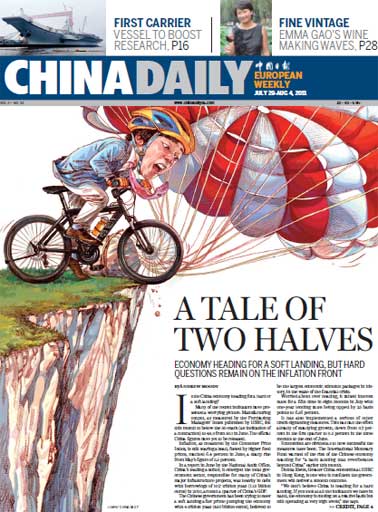Editorials
Small sigh of relief
Updated: 2011-08-03 07:52
(China Daily)
Over the past few months, the world has watched with uneasiness and frustration the political drama unfolding in Washington, capital of the world's largest economy.
The fierce partisan debate over raising the debt ceiling was so ugly that it threatened to hold hostage not only the United States' own economic and social well-being but also the global economy, by forcing the US government to default on its payments on a broad range of programs at home as well as bondholders abroad.
But the world, especially the countries that hold an enormous amount of US government bonds, can now heave a sigh of relief, though for a limited period of time.
On Monday, the US House of Representatives passed a budget bill that will cut more than $2.1 trillion in government spending over the next decade and raise the $14.29 trillion-limit of the federal debt by up to $2.4 trillion.
After the Senate passes the bill, the US Treasury Department will be enabled to continue to meet its domestic and international financial obligations.
Under the agreement, a new joint congressional committee will be established to come up with suggestions that may lead to reforms in government spending and changes in tax policies. All this may open ways for the US government to reduce its deficit.
However, the bill's passage will provide little relief to the US economy, which is plagued with a 9-percent unemployment rate and a huge public debt.
In fact, the International Monetary Fund (IMF) in its recent analysis of the US economy predicts: "We don't expect a really fast recovery going forward. Importantly, we don't expect that the (US) economy will recuperate fully to the previous output trend."
Anyone traveling in small and medium-sized cities in the US will come across empty warehouses and boarded-up shops and hear local people complain of how the middle-aged can't hold onto their jobs and the young find it hard to start a career.
The central issue, as Joseph E. Stiglitze and many other economists have repeatedly pointed out, is that the US has not started to address the core problems that drove the US and the world into financial crisis and economic downturn in the first place.
As a result, the wealth divide between the rich and poor is widening - the wealthiest Americans have again been successful in preventing a tax increase.
Meanwhile, the US government has yet to prove its effectiveness by stimulating job creation and tightening its regulation on financial institutions. As it has no fresh policies to boost the economy, there will clearly be no quick fix and more political disruptions are expected as the country is preparing for the forthcoming presidential elections.
The global economy is interconnected, which means other countries, especially emerging economies, must maintain their vigilance and come up with more measures to cooperate with each other and bolster each other's economic growth.
China Daily
(China Daily 08/03/2011 page8)
E-paper

Double vision
Prosperous Hangzhou banks on creative energies to bridge traditional and modern sectors
Minding matters
A touch of glass
No longer going by the book
Specials

Carrier set for maiden voyage
China is refitting an obsolete aircraft carrier bought from Ukraine for research and training purposes.

Pulling heart strings
The 5,000-year-old guqin holds a special place for both european and Chinese music lovers

Fit to a tea
Sixth-generation member of tea family brews up new ideas to modernize a time-honored business
